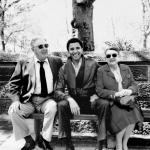David French writes a weekly column at The Dispatch. Since he is an outspokenly evangelical Protestant, the kind for whom wearing your earnest faith on your sleeve is a virtue (but what do you do about t-shirts?), he regularly writes about matters of faith. About a week ago, Mr. French decided to worry about the effects of power and established institutions on Christianity — specifically, evangelical Protestantism:
As I’ve written before, America doesn’t have a state-established church, but it certainly possesses a version of the Christendom Kierkegaard despised. America possesses immensely powerful, immensely wealthy Christian institutions that may not be part of the state but in many places are strong enough to exercise power over the state. And they certainly create their own culture, a culture that shapes the daily lives of millions of Americans.
Mr. French never really identifies the religious establishment in the U.S. He seems to associate it with Christian ministries that gain wide followings and contributions, and that are widely available through social media. I am not sure how powerful that kind of Christianity is. It is popular. But sure Mr. French knows that to be popular — think a former President — is not to have power even to withdraw troops from Afghanistan or silence a federal official responsible for allergies and infectious disease research and advice. Mr. French does bring up the problem of sexual abuse among Protestant and Roman Catholic church leaders. But it is hardly the case that either side in those revelations came out looking good or are immune to legal sanctions.
So what Christendom is Mr. French talking about. At the beginning of the paragraph quoted above, he links to a piece he wrote two years ago about Jerry Falwell Jr. and Liberty University.
There again, Mr. French linked religious establishment to success, revenue, and popularity:
The Evangelical analogue to the state religious establishments of years past — the “Christendom” that all-too-often redefined the faith as a kind of cultural and legal conformity, a rote adherence to external religious dictates — is the creation of a series of extraordinarily wealthy, powerful, and influential institutions that not only reach and influence Americans by the tens of millions, but also shape the course and conduct of the domestic and foreign policy of the most powerful nation in the history of the world.
A form of Christendom is necessary and important. That form should not be state-sanctioned Christianity, but rightly oriented private institutions that facilitate the spread of the Gospel and the compassionate works of the church. I’ll never forget the kind and loving Catholic social worker from Catholic Charities of Tennessee who helped my Calvinist family adopt an Ethiopian Orthodox child.
(There is that habit of Mr. French to refer to his multicultural family.)
His point though is not really about establishment but about the tension between institutions that minister Christianity to believers and Christianity itself. Mr. French seems to be worried that the institutions take over the brand, and so supporting Liberty University is the same as supporting Christianity. The related point is that Christianity is bigger than institutions. Since Mr. French is a member of a Presbyterian Church of American congregation, some might be surprised that he is unfamiliar with the confessional language of “the visible church” is the “kingdom of the Lord Jesus Christ.” Old versions of Protestants actually look at churches — with their doctrinal exams for clergy, their rites of ordination, their rightly ordered worship services for inculcating the faith — at those institutions as essential to the Christian brand. (A Christian university? Not so much.) Mr. French may not understand this because he grew up Pentecostal where the Spirit can overwhelm form and institution.
The real problem, for Mr. French, is the unpopularity of Christianity thanks to the hypocrisy of evangelical celebrities
When we study declining faith in America, especially among America’s younger generations, we hear time and time again that hypocrisy and corruption within Christian institutions alienate American hearts and minds. We don’t want to hear that message. We claim time and again, often with justification, that we’re defamed in the media. “We’re better people than they say,” we think. “If only you truly knew us, then you’d feel the warmth in our hearts.”
But those with eyes to see can plainly view Jerry Falwell Jr.’s thumbs-up picture in front of a Playboy cover. They can recognize double standards, including Franklin Graham’s righteous anger at Bill Clinton’s lies giving way to his emphatic declaration that Trump’s infidelities and illegal payoffs are “nobody’s business.” They can see in their own communities when faith leaders cover up abuse or engage in the petty intolerance or self-dealing that Politico exposed at Liberty.
Is Mr. French truly embarrassed by the likes of Falwell and Graham? Has his church membership so little claim on his identity that if popular religious figures do stupid things, Mr. French frets losing credibility?
Or could it be that pointing out the hypocrisy of evangelicals is his beat as a opinion journalist? That is, does Mr. French gain credibility as someone who is part of the evangelical world and who is not like those bad evangelicals? His editors, in turn, have a reliable source (“he’s an evangelical”) and a righteous voice (“he disapproves of those embarrassing evangelicals”).
Those factors may be true, but they don’t make Mr. French the best judge of Christianity’s place in America. He is not the darling of the media, but he receives far better coverage and many more invitations to speak to and write for mainstream publications than Falwell or Graham ever did/do. In fact, without institutions — legal, military, academic, and journalistic — Mr. French would not be who he is. And without the beating that evangelicals have taken for the last five years in popular and elite opinion, Mr. French would not have the platform he does.












